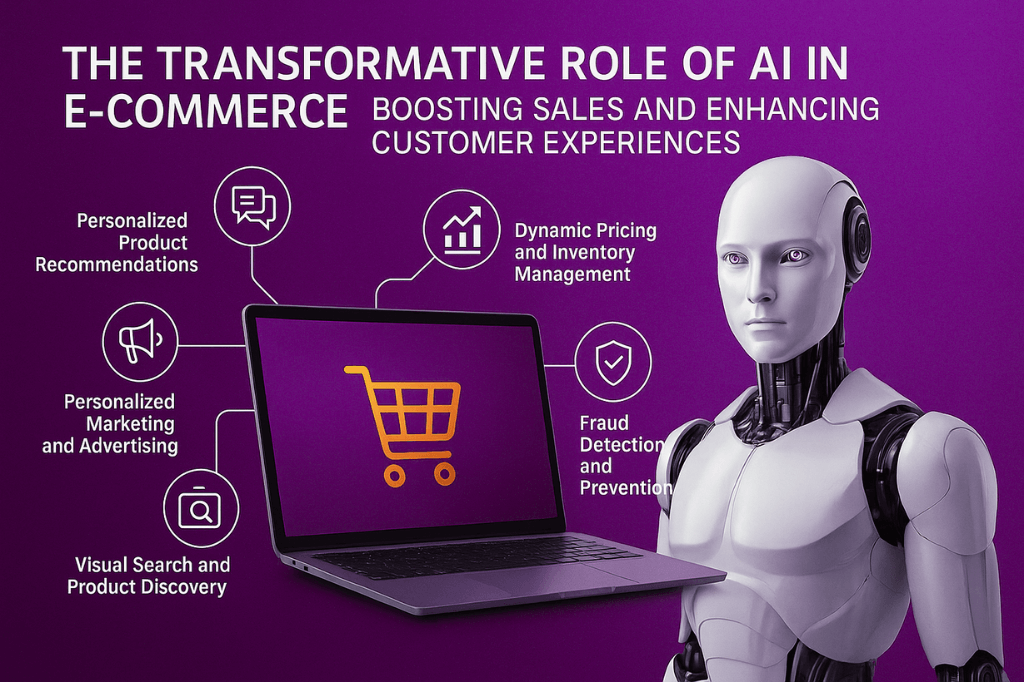Artificial intelligence (AI) is no longer a futuristic fantasy; it’s a powerful reality reshaping the e-commerce landscape. For businesses striving for online success, understanding and leveraging the role of AI in e-commerce is no longer optional – it’s essential for staying competitive and achieving sustainable growth. This article delves into the key ways AI is revolutionizing online retail, providing actionable insights for businesses looking to harness its potential.
Understanding the Power of AI in E-commerce
At its core, AI empowers e-commerce businesses to analyze vast amounts of data, automate repetitive tasks, personalize customer interactions, and ultimately drive sales. By mimicking human intelligence in various processes, AI offers unparalleled efficiency and the ability to understand customer behavior on a deeper level. This translates into a more streamlined operation, enhanced customer experiences, and a significant boost to the bottom line.

Key Ways AI is Revolutionizing E-commerce
Several key applications of AI are currently transforming how e-commerce businesses operate and interact with their customers:
1. Personalized Product Recommendations
One of the most visible roles of AI in e-commerce is its ability to provide highly personalized product recommendations. By analyzing browsing history, purchase patterns, demographics, and even real-time behavior, AI algorithms can suggest products that customers are more likely to buy. This not only increases conversion rates and average order value but also enhances the shopping experience by making it more relevant and engaging.
2. Enhanced Customer Service with AI Chatbots
AI-powered chatbots are becoming increasingly sophisticated, providing instant and efficient customer support 24/7. These intelligent virtual assistants can answer frequently asked questions, guide customers through the purchasing process, resolve basic issues, and even escalate complex queries to human agents. This improves customer satisfaction, reduces the workload on support teams, and ultimately contributes to higher retention rates.
3. Dynamic Pricing and Inventory Management
AI algorithms can analyze market trends, competitor pricing, demand fluctuations, and inventory levels to dynamically adjust product prices in real-time. This ensures optimal pricing strategies, maximizing profits while remaining competitive. Furthermore, AI can predict future demand, enabling businesses to optimize inventory management, reduce stockouts, and minimize holding costs
4. Fraud Detection and Prevention
The online environment is susceptible to fraudulent activities. AI plays a crucial role in identifying and preventing fraudulent transactions by analyzing patterns and anomalies in real-time. Machine learning algorithms can flag suspicious behavior, protecting both the business and its customers from financial losses and reputational damage.
Read About The Role of AI (Artificial Intelligence) in Payment Integrity
5. Personalized Marketing and Advertising
AI empowers e-commerce businesses to create highly targeted and personalized marketing campaigns. By analyzing customer data, AI can segment audiences based on their preferences and behaviors, delivering tailored messages and offers through various channels. This leads to higher engagement rates, improved conversion rates, and a more efficient marketing spend.
6. Visual Search and Product Discovery
AI-powered visual search allows customers to find products using images instead of text. This enhances the shopping experience, especially for visually driven products like fashion or home decor. Customers can simply upload an image, and AI algorithms will identify similar items in the online store
Optimizing Your E-commerce Strategy with AI
To effectively leverage the role of AI in e-commerce, businesses should consider the following:
- Data is Key: AI algorithms thrive on data. Ensure you have robust data collection and management systems in place.
- Start Small and Scale: Begin with implementing AI in one or two key areas and gradually expand its application as you gain experience and see results.
- Choose the Right Tools: Research and select AI-powered tools and platforms that align with your specific business needs and goals.
- Focus on Customer Value: Always prioritize how AI can enhance the customer experience and solve their pain points.
- Continuous Learning and Adaptation: The AI landscape is constantly evolving. Stay updated on the latest advancements and adapt your strategies accordingly.
Conclusion: Embracing the AI-Powered Future of E-commerce
The role of AI in e-commerce is undeniable. From personalized recommendations to enhanced customer service and fraud prevention, AI offers a multitude of opportunities for businesses to optimize their operations, elevate customer experiences, and drive significant growth. By understanding the various applications of AI and implementing them strategically, e-commerce businesses can position themselves for success in the increasingly competitive online marketplace. Embracing the AI-powered future is not just an advantage – it’s becoming a necessity for thriving in the world of online retail.


